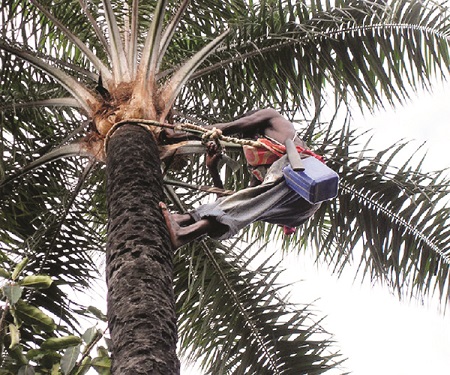Palm wine is an alcoholic natural beverage produced only from sap of a palm tree and usually found in rural areas near palm grooves and swampy areas.
The News Agency of Nigeria (NAN) spoke with some palm wine tappers in the Federal Capital Territory (FCT).
They said and that its processing was unique and different from other types of wine.
Joseph Sabo, a palm wine tapper at Masaka Community in Nasawara State, near Abuja, said that palm wine was naturally produced by God and kept for extraction from the palm tree.

According to him, there are two ways to extract the sap from the palm tree.
“Either you make a small cut at the stem, just below the head of the tree or you cut the head of the tree and allow it to lie for days.
“Then you insert a receptacle, a small bamboo tube, to extract the sap from the tree.”
Read Also: “It’s senseless violence” – Miyetti Allah condemns Plateau attack that left 22 dead
Sabo said that the quantity of sap that was extracted from one palm tree depended on the mode of extraction.
Although palm wine has a long history in African society, its popularity cannot be overemphasised.
Mr Chuks Madu, a palm wine tapper in Apo community, said the white liquid wine was of two types, the wine from the palm tree and that from a raffia tree.
“There is palm wine tree, which mostly grows on land and raffia palm tree, which mostly grows around the river or swampy areas.
“Their processes of extraction are the same though slightly different.
“The first sap from the palm wine tree after extraction, with no fermentation, is sweet and has no alcohol.
“But raffia wine, the first sap extracted from the tree is not as sweet as the palm wine.
“The extraction and process requires patience, you have to clean the cut where the sap is extracted every four days.
“The wine also is diluted with little water before bringing it out for consumption.
Madu said that the raffia palm tree could only last for two months after the extraction but palm trees could last for months and years depending on the mode of extraction.
Reports say the cultural belief and practice of communities affect the taste of palm wine because of mode of extraction from the tree.
Mr Ebele Uzo, from Oba in Anambra, who is resident in Kubwa, a suburb in the FCT, said palm wine was highly respected in his community.
“In my place, you cannot keep the wine on a cemented floor, otherwise it will lose its taste, unless you put a cloth, leaves or wood on the floor before keeping the keg of the palm wine.”
NAN also learnt that the natural wine loses its taste and becomes more alcoholic as days pass by.
Mrs Abigail Ikuomola, a teacher, told NAN that she takes it fresh because she doesn’t take alcohol.
“It is better taken same day if you don’t take alcohol, it is more enjoyable when served fresh.
“Where I come from in Ilaje-Ese Odo, we process Ogogoro from palm wine, apart from fish, it is also our major means of livelihood,” Ikuomola said.
Madam Agbeke Omifunmito, an Osun Devotee, told NAN that she doesn’t take palm wine, because she is an Osun devotee, she said “devotees do not drink palm wine, it is forbidden, We only use it to appease Ogun (the Yoruba god of Thunder).
She explained that culturally, palm wine had different uses. Some use it for worship of the gods, prayer, cure for certain ailments especially the eyes and nursing mothers.
“When women give birth and are not lactating, palm wine is given to them to aid lactation. It also helps the nursing mother and baby to relax and sleep well,” Omifunmito said. (NAN)
Read Also: Pap, palm wine do not enhance flow of breast milk – Doctor tells nursing mothers



Leave a Reply